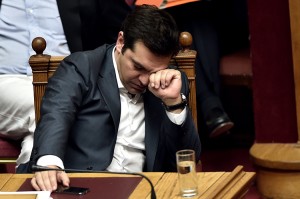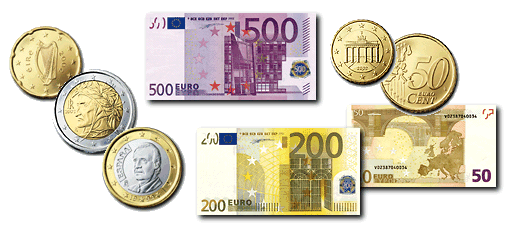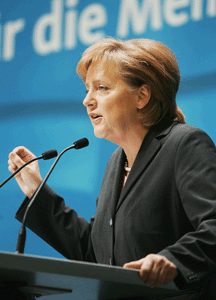A Greek Tragedy
Thursday, July 16th, 2015July 16, 2015

Greek Prime Minister Alexis Tsipras during a session of parliament on the evening of July 15, 2015. Credit: © Aris Messinis, AFP/Getty Images
Late last night, Greek lawmakers voted to accept austerity measures proposed by the European Union (EU) in return for a financial bailout of 86 billion euros ($94 billion). No one had been sure how the vote late on Wednesday would go. Greek legislators were asked to choose between two difficult options. On the one hand, they could choose a reform package of austerity measures similar to those that, over the last five years, had inflicted great hardship on Greece and its people and to which 60 percent of the Greek people had voted “no” just last week. The other choice led to leaving the eurozone and probably the EU, reinstating its old currency (the drachma), and the upheaval of financial collapse.
Greek Prime Minister Alex Tsipras came to power on Jan. 26, 2015, as the leader of Syriza, an anti-austerity party. After five years of EU-mandated austerity, the Greek government still owed a large amount in national debt and the Greek economy had shrunk by 25 percent. On July 5, the Greek people had voted against a nearly identical bailout package in a national referendum. Tsipras had pushed hard for debt reduction for Greece as part of the bailout, but stronger members of the EU, especially Germany, were totally opposed. Tsipras stated that although he strongly disagreed with the terms of the final EU bailout deal, he still was asking the Greek parliament to vote in favor of it. The bill passed, but some 60 members voted against it, including 32 from Tsipras’s own party, splitting the unity of Syriza.
The bailout package must garner parliamentary approval by all of the eurozone countries. Until this bailout can be finalized, the EU is preparing a bridge fund of 7 billion euros to reopen Greece’s banks and temporarily prop up its economy.
A report from the International Monetary Fund (IMF), released on Tuesday, July 14, stated that debt reduction needed to be a part of the bailout given to Greece in order for the country to have any hope of recovering from its economic woes. The IMF was quoted in the report as saying, “Greece will need debt relief far beyond what eurozone partners have been prepared to consider due to the devastation of its economy and banks in the last two weeks.” Because the IMF is a major creditor for Greece, perhaps there will be some additional negotiation concerning this bailout, Greece’s third in five years.
Other Behind the headline articles:





